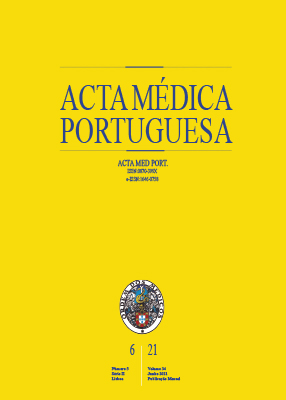A Rare Presentation of Multi-Organ Embolism in a Multifactorial Hypercoagulable State: Case Report
DOI:
https://doi.org/10.20344/amp.12856Keywords:
Foramen Ovale, Patent, Lung Neoplasms, Paradoxical Embolism, ThrombophiliaAbstract
Paradoxical embolism is an uncommon phenomenon, accounting for only 2% of all cases of systemic arterial embolism. This condition suggests the presence of a patent foramen ovale, present in 20% - 25% of the adult population. The authors report the case of a 63-year-old male patient with a history of lung adenocarcinoma and hereditary thrombophilia admitted to hospital with acute onset of dyspnea, diplopia, confusion and decreased motor strength of the right limbs. Cranial computed tomography scan showed acute ischemic injury in the left posterior cerebral artery and computed tomography pulmonary angiography revealed bilateral pulmonary thromboembolism. A transesophageal echocardiogram confirmed the presence of patent foramen ovale. The patient was treated with anticoagulant therapy with progressive clinical improvement. Due to a high risk of recurrent thromboembolic episodes, the percutaneous closure of patent foramen ovale was performed and anticoagulant therapy was maintained indefinitely.
Downloads
Downloads
Published
How to Cite
Issue
Section
License
All the articles published in the AMP are open access and comply with the requirements of funding agencies or academic institutions. The AMP is governed by the terms of the Creative Commons ‘Attribution – Non-Commercial Use - (CC-BY-NC)’ license, regarding the use by third parties.
It is the author’s responsibility to obtain approval for the reproduction of figures, tables, etc. from other publications.
Upon acceptance of an article for publication, the authors will be asked to complete the ICMJE “Copyright Liability and Copyright Sharing Statement “(http://www.actamedicaportuguesa.com/info/AMP-NormasPublicacao.pdf) and the “Declaration of Potential Conflicts of Interest” (http:// www.icmje.org/conflicts-of-interest). An e-mail will be sent to the corresponding author to acknowledge receipt of the manuscript.
After publication, the authors are authorised to make their articles available in repositories of their institutions of origin, as long as they always mention where they were published and according to the Creative Commons license.









